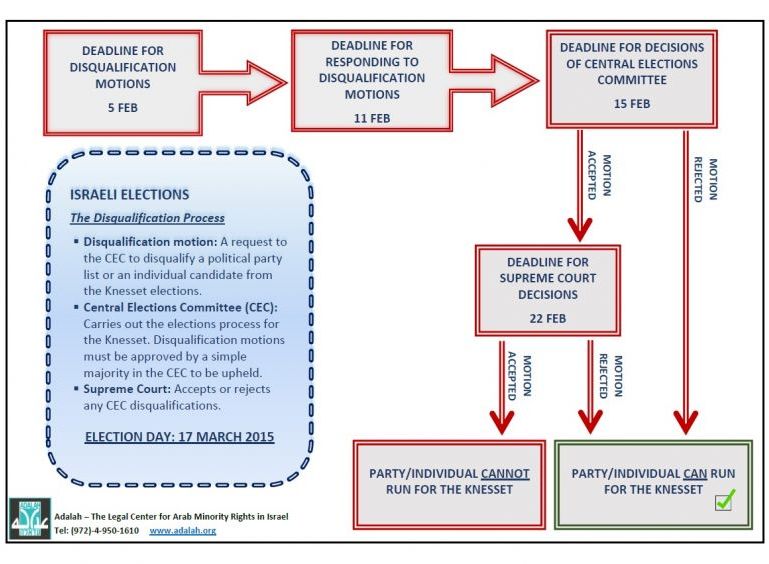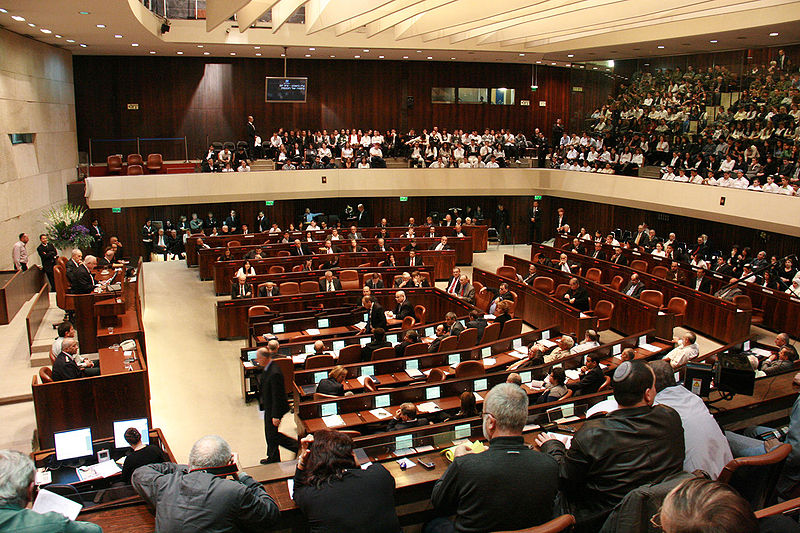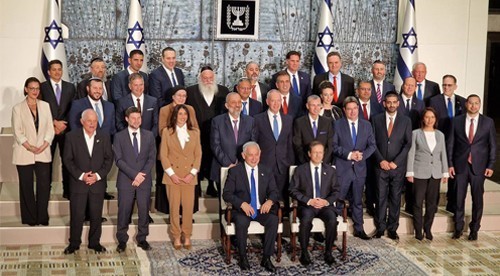Election Q&A: March 2019 Israeli Elections and Arab Parliamentarians
[CLICK HERE to read in PDF format]
When and for what purpose is Israel holding elections?
Israel will hold parliamentary (Knesset) elections on 9 April 2019. The elections will determine the composition of the 21st Knesset, which has 120 seats.
Who will vote?
Israeli citizens aged 18 years and over have the right to vote, including Palestinian Arab citizens of Israel, who make up about 1.6 million people or 20 percent of the state's population. According to the Israel Democracy Institute, in the last elections for the 20th Knesset (2015-2019), the voter turnout was approximately 72.3% overall and about 64% among Palestinians in Israel.
Which Jewish Israeli political parties are running in the election?
Forty-seven (47) candidates' lists in total have entered the race for the Knesset. Based on recent polls, it is likely that twelve of these lists will win seats.
The Israeli Zionist parties fall into four general categories: the right wing; the religious; the center; and the left. The right wing camp includes Likud, led by current Prime Minister Benjamin Netanyahu; the New Right, founded by Education Minister Naftali Bennett and Justice Minister Ayelet Shaked; Yisrael Beiteinu, led by former Defense Minister Avigdor Lieberman; and a slate comprised of Jewish Home, National Union, and the Kahanist Jewish Power. The religious camp includes parties such as Shas and United Torah Judaism, which are likely to form coalitions with the leading party. The centrist parties include Blue and White, a joint slate made up of Israel Resilience, led by Benny Gantz and other former military generals, and Yesh Atid, led by Yair Lapid; Kulanu, led by Finance Minister Moshe Kahlon; and Labor, led by Avi Gabbay. The left camp includes Meretz, led by MK Tamar Zandberg.
Which Arab-led political parties are running in the elections?
There are four main Arab-led parties participating in the 2019 election, which are running as two slates. The first slate is made up of the Democratic Front for Peace and Equality (Hadash/Jabha) party, led by MK Ayman Odeh, and the Arab Movement for Renewal (Ta'al), led by MK Dr. Ahmed Tibi. The second slate is made up of the National Democratic Assembly (Balad/Tajammu'), led by Dr. Metanes Shehadeh, and the United Arab List (Ra'am), led by Dr. Mansour Abbas.
In the previous election in 2015, the four Arab-led parties ran together in a united slate called the Joint List. The Joint List held 13 out of 120 seats, making it the third largest party in the Knesset after the Likud and the Zionist Union. Many small parties ran and/or are running together due to the raising of the electoral threshold from 2% to 3.25% in 2015.
Is fair representation for the Arab national minority guaranteed in the Knesset?
No. No seats are designated for Arab political party lists or candidates, and there is no quota system to ensure that Palestinian citizens of Israel are appropriately represented in the parliament. Since 1949, no Arab party has been invited to join or has been included in governmental coalitions.
What is a disqualification motion and who can file it?
A disqualification motion is a request filed to the Knesset's Central Elections Committee (CEC) to disqualify a political party list or an individual candidate from the elections. A simple majority of 51% percent of CEC members is required to approve the motion. Any citizen aged 18 years and over can file a disqualification motion to the CEC. The Attorney General can also file such a motion.
What law governs the disqualification process?
The Elections Law (Consolidated Version) – 1969 governs the process of filing, deciding on, and appealing against decisions on motions for disqualification. Article 7A of the Basic Law: The Knesset – 1985 (and subsequent amendments) enumerates the grounds on which a party or individual candidate can be disqualified from the elections.
Article 7A of the Basic Law: The Knesset, entitled "Prevention of participation in the elections", provides that a candidate or a political party list may be disqualified from Knesset elections if their goals or actions, including speech: (i) deny the existence of the State of Israel as a Jewish and democratic state; (ii) incite to racism; or (iii) [offer] support of armed struggle to an enemy state or to a terrorist organization against the State of Israel.
The vaguely-worded provisions of Article 7A are dangerous as they could be used to ban a party that adopts political positions like supporting a one-state solution, or a "state for all its citizens", on the basis that they constitute some form of denial of the nature of the Jewish state. Further, the law does not define a "terror organization" or what acts would constitute offering "support" for an armed struggle.
What is the Central Elections Committee (CEC)?
The Knesset Elections Law (Consolidated Version) of 1969 establishes the Central Elections Committee (Va'adet HaBehirot HaMerkazit) in order to carry out the elections process for the upcoming Knesset. A Supreme Court justice, chosen by the Supreme Court, heads the committee. Justice Hanan Melcer is the chairperson of the CEC for the current election cycle.
The functions of the CEC include: receiving the lists of candidates and party platforms and approving them; other technical duties related to facilitating the voting; training elections staff; collecting the elections results from each polling station; and tallying and publishing the elections results, among others. The CEC also holds hearings and decides on motions to disqualify political party lists and individual candidates from running in the elections.
Is there an appeal process from the CEC's decisions?
If the CEC votes to disqualify an individual candidate, it must forward its decision and arguments to the Supreme Court for approval. If the CEC decides to disqualify a political party list, the list has the right to appeal to the Supreme Court under Article 64 of the Elections Law (1969). The Supreme Court has previously overturned CEC decisions to disqualify Arab political party lists and candidates.
In the 1980s, the CEC barred former MK Meir Kahane and his Kach party from the Knesset for racism, and this decision was affirmed by the Supreme Court. Kahane and Kach engaged in violent activities, advocated for legislation to forbid sexual relations between non-Jews and Jews, to separate Jewish and Arab neighborhoods, and to prohibit meetings of any sort between young Jews and Arabs.
Have disqualification motions been filed against Arab parties or candidates for the 2019 elections?
Yes – four disqualification motions have been filed against Arab parties and candidates in 2019.
Two motions were filed against Balad-Ra'am: one filed by Michael Ben-Ari and Itamar Ben-Gvir (Jewish Power), and another filed by the Likud party and its member MK David Bitan, former chair of the 2015-19 government coalition.
A third motion was filed against Hadash-Ta'al by Michael Ben-Ari and Itamar Ben-Gvir.
A fourth motion was filed specifically against Ofer Cassif (Hadash) by the Yisrael Beiteinu party and its members former Defense Minister Avigdor Lieberman and MK Oded Forer.
The disqualifications motions primarily cite political statements and activities of current and former members of the Arab-led parties, including remarks promoting a "state for all its citizens" and critiquing the discriminatory nature of Israel's identity as a Jewish state.
Have there been previous disqualification motions against Arab political parties and candidates?
Yes – in every election cycle for the past 20 years.
In December 2002, the CEC voted to disqualify the Balad/Tajammu' party and MK Azmi Bishara specifically from the 2003 Knesset elections, arguing that they "deny the existence of the State of Israel as a Jewish and democratic state," and "support an armed struggle of an enemy state or terrorist organization against the State of Israel." Following Adalah's petition, the Supreme Court cancelled the CEC's decision in a 7-4 decision, and reinstated both Balad and MK Bishara for candidacy in the elections.
In the 2013 elections, right wing MKs asked the CEC to disqualify Arab parties Balad/Tajammu' and Ra'am-Ta'al, as well as MK Zoabi as an individual candidate, from the elections. MK Zoabi's disqualification was approved by the CEC, but overturned unanimously by the Supreme Court.
Ahead of the 2015 elections, the CEC approved (by 27 votes to 6) disqualification motions that were filed by Likud and Yisrael Beiteinu against MK Haneen Zoabi (Balad/Tajammu'), claiming that she "supports the armed struggle of terrorist organizations". The CEC's decision contradicted the position of the Attorney General, who opposed MK Zoabi's disqualification. The Supreme Court overturned the CEC's decision in an 8-1 ruling.
Based on past experience, Adalah expects that the majority of the CEC will approve some or all of the disqualification motions against the Arab parties and Ofer Cassif (Hadash), since the CEC is composed of the political parties that were represented in the previous Knesset. Most of these parties are right wing and hostile towards the rights of Palestinian citizens of Israel to equal political participation.
Are there other methods to exclude Arab parties and representatives from political participation?
Yes. For example, the "Expulsion Law", enacted in 2016, allows a majority of 90 Knesset members to oust a serving Knesset member on two grounds: 1) incitement to racism; and 2) support for armed struggle against Israel. The law was passed as an amendment to the Basic Law: The Knesset, specifically to target Arab MKs, due to their vocal opposition to Israeli government's policies. In May 2018, the Supreme Court rejected a petition filed against the law by Adalah, the Association for Civil Rights in Israel (ACRI), and MK Yousef Jabareen (Hadash/Jabha).
Other methods have also been used in recent years to restrict Arab MKs' political activities in a discriminatory manner.
In March 2018, the Knesset Ethics Committee barred MK Yousef Jabareen from participating in lectures in the United States sponsored by Jewish Voice for Peace (JVP), based on a new amendment to the Knesset's Code of Ethics that gives the committee the power to forbid an MK from traveling overseas if funding for the trip is provided by a body that knowingly publishes a call to boycott the State of Israel or participates in such a boycott. A petition filed by Adalah and MK Jabareen to cancel the committee's decision is currently pending before the Supreme Court.
The Ethics Committee has also used its authority on several occasions to suspend Arab Knesset members from parliamentary meetings due to their political speech. For example, in 2014, the Supreme Court rejected a petition submitted by Adalah and ACRI on behalf of Arab MK Haneen Zoabi (Balad/ Tajammu') against the Committee's decision to suspend MK Zoabi from all parliamentary meetings for six months, based on statements that she made during the Israeli military's "Operation Brother's Keeper" in the occupied West Bank.
In June 2018, the Knesset Presidium refused to allow the submission of a bill proposed by Balad/Tajammu' MKs which would declare Israel a "state of all its citizens", based on the claim that Israel is a Jewish state. The bill was initiated in response to the advancement of the Jewish Nation-State Law, which was passed by the Knesset in July 2018. In December 2018, the Supreme Court dismissed a petition filed by Adalah on behalf of the Balad/Tajammu' MKs to cancel the Presidium's decision; in doing so, the Court refused to even allow a discussion of equal rights and a state for all it citizens in the Knesset.
Important dates regarding disqualification motions
- 28 February: Deadline for submitting disqualification motions to CEC.
- 4 March: Deadline for submitting responses to disqualification motions.
- 6 March: Hearings in the CEC on the disqualification motions
- 10 March: CEC deadline to decide on disqualification motions.
- 12 March: Deadline to appeal to Supreme Court on CEC decisions.
- 17 March: Deadline for Supreme Court rulings in appeals on CEC decisions.
Historical background on Palestinian participation in Knesset elections
Palestinian citizens of Israel have run in every election and been elected to every Knesset since the first Knesset elections in 1949. One Arab party, the Democratic List of Nazareth, won enough seats to cross the basic threshold in 1949, taking two seats. Until the 1960s, all Arab parties in the Knesset were affiliated with Mapai, the ruling party, a forerunner of the Labor party, which did not accept Arab members itself.
In 1965, an independent Arab list attempted to run for Knesset elections, with the Al-Ard movement forming the United Arab List. However, the Supreme Court banned the list in the Yardor case on the ground that it "den[ied] the integrity of the State of Israel and its very existence." This decision was arbitrary as it was not based on any evidence or any law; it predated the enactment of Article 7A of the Basic Law: The Knesset.

















